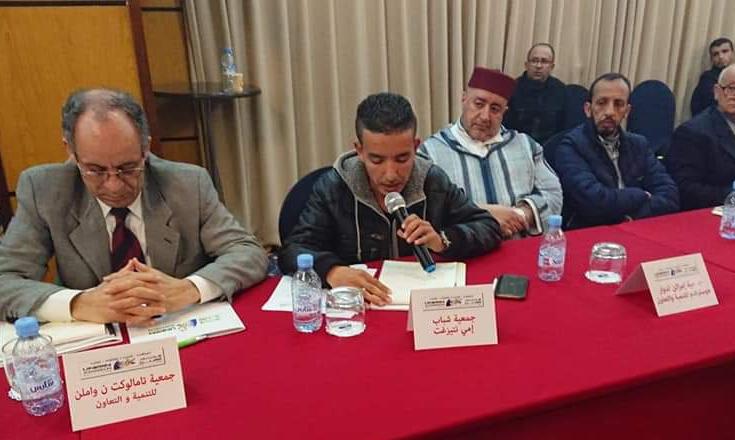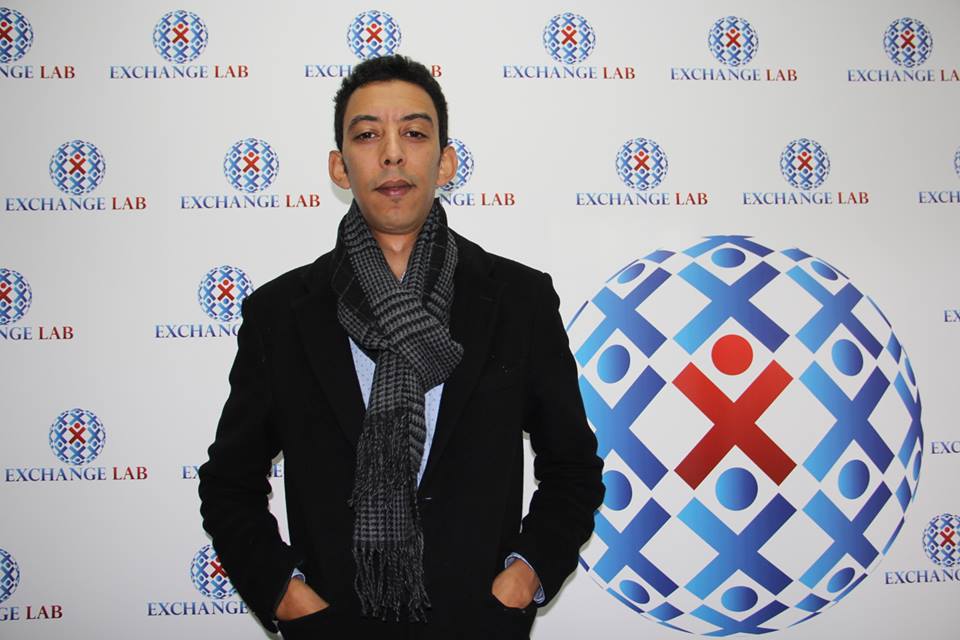Youth Association in Tafraout Area: For Better Life Quality in Rural Berber Areas

By Ezzoubeir Jabrane
The villages of the Ameln Valley in the central part of the Anti-Atlas Mountains in Morocco have a long history and a deep-rooted tradition that is indisputably an indispensable part of the Moroccan cultural mosaic. These villages are fraught with natural sites that attract tourists from all over the world, and most importantly, have a human capital that is increasingly aware of the necessity of developing the area, in order to stop the local’s immigration to other areas and countries. For this matter, its numerous associations, such as Youth of Imin’tizeght Afella-Oassif Association, have been striving to promote its tourism, agriculture, handicraft, and local products like Argan oil among other things.
Founded two years ago, Youth of Imin’tizeght Afella-Oassif is an association that seeks primarily to give a new impetus to the promotion of human capital in a number of villages located in the valley of Ameln. The members share a deep understanding of their environment, its resources and limitations, and an awareness about the more global problems like global warming as well as a set of modern-day mind and skillset. They believe they have the most important resource, their youth, and they rely on it to realize their projects. Nonetheless, they eagerly seek the collaboration of older generations, which stems from the high regard older people have, specific to collectivistic societies such as Morocco.

In an interview with International Morocco, the president of Youth of Imin’tizeght Afella-Oassif, BelQassem Lemhamdi Alaoui, highlighted that the association’s objective is to develop the villages socially, economically, culturally, and educationally. Qassem, as he goes by, explained that his association chiefly works on strengthening “the spirit of initiative, solidarity and sharing” among the residents of surrounding villages. Another aim is to “spread the principles of social economy” and thereby create job opportunities for the locals in order to slowdown immigration toward big cities or other countries. Moreover, it organizes educational and cultural events to sensitize the residents about the issues they are facing at the local, national and global level.

Qassem pointed out that in order to guarantee the commitment of the residents and the continuation of their activities, it is “important to develop connections with governmental and non-governmental organizations in different fields, in Morocco and abroad”. This gives the association access to a broad pool of opportunities. “Equally important” adds Qassem, “is exposing our youth to as many trainings as possible in different disciplines.”
Despite the fact that Qassem has not yet graduated from university where he majors in Geography, he finds time to create and manage a number of other clubs and initiatives. In addition to the mentioned association, he is president of Tafraout Club for Bicycles and Mountain Tourism, and member of Ameln Service, a branch of Ameln Union of associations that specializes in the protecting the environment and waste-recycling in the Ameln valley.

The executive committee at the Youth of Imin’tizeght Afella-Oassif Association is made of 6 members. Qassem, who takes pride in the fact that these positions are divided equally between young male and female members, says that they have been successful in drawing all segments of their society to their projects. In addition, “the presence of female members has proven to be very efficient in our conservative society as they have more access to the female population than the male members do.”

In a span of two years, the association has accumulated laudable achievements. It convinced 250 people to contribute to the construction of a swimming pool for children and teens, and has organized trainings for the locals in video editing, sport tournaments, competitions, excursions for national and foreign tourists, environmental campaigns and celebrations such as International Women’s Day. With very limited resources, they have also mobilized the residents to preserve the villages and engaged them in diverse activities such as painting the sidewalks and drawing murals. Cognizant of the importance of preserving and reviving aspects their Amazigh culture, the association has also organized many festivities that were attended by many.

Asked about their future projects, Qassem unveiled that their organization gives priority to breaking the isolation that these villages suffer, through building roads inside villages. He adds that this will also make it easier for ambulances and civil protection trucks to get to every house if something happens. Qassem went on to say that they also aim to create sports infrastructure such as football stadia, and build a center to receive members of the national and international associations they are in contact with. In order to do all this, he explained, “it is essential to to encourage collaboration among people rather than unhealthy completion.”
For Qassem young people throughout the world should take the lead and start different initiatives, for they are more prone to collaborate than to fight. For this reason, he extends his hand to all sorts of national and international youth organizations operating in different fields:
“Contact on Facebook or via email. We can exchange ideas for a world without wars and racism.”
Facebook: (LINK)
Email: associationajia@gmail.com

Ezzoubeir Jabrane
Ezzoubeir Jabrane is a writer, teacher and entrepreneur. He holds a Master’s Degree in Linguistic and Literary Studies. He has written over 1000 articles in different fields. He works as a teacher of Academic English at Hassan II University in Casablanca and a teacher of English for Engineering in the National Higher School of Arts and Craft (ENSAM), in addition to a number of other institutions. Ezzoubeir is the founder of Exchange Lab and a founding member of International Morocco. His company Exchange Lab offers 3 services revolving around the use of English in the workplace: content and multimedia content creation, translation services, and language instruction.

Ezzoubeir Jabrane
Ezzoubeir Jabrane is a writer, teacher and entrepreneur. He holds a Master’s Degree in Linguistic and Literary Studies. He has written over 1000 articles in different fields. He works as a teacher of Academic English at Hassan II University in Casablanca and a teacher of English for Engineering in the National Higher School of Arts and Craft (ENSAM), in addition to a number of other institutions. Ezzoubeir is the founder of Exchange Lab and a founding member of International Morocco. His company Exchange Lab offers 3 services revolving around the use of English in the workplace: content and multimedia content creation, translation services, and language instruction.

No comments:
Post a Comment